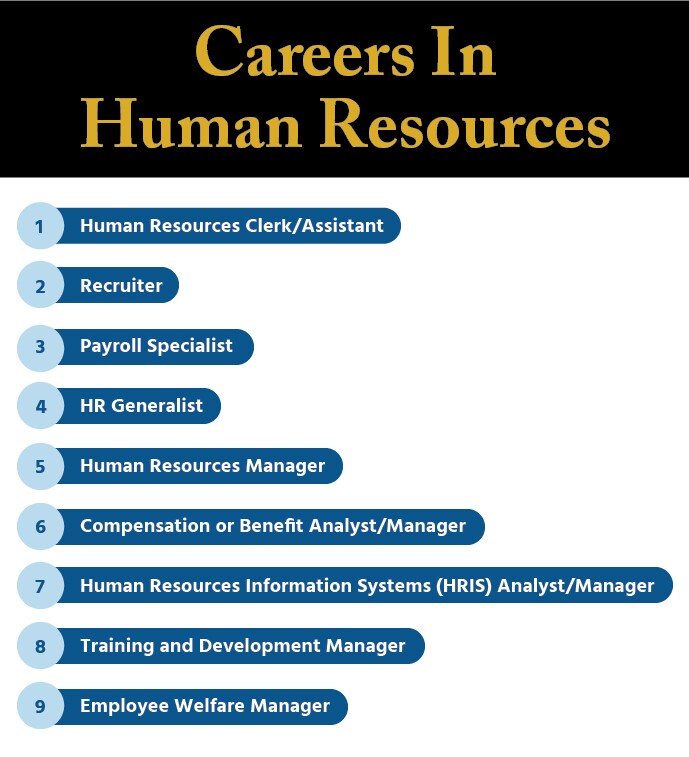One of the greatest benefits of pursuing careers in human resources (HR) is that it's an exceptionally broad field with many different paths for success. Whether you’re trying to figure out how to start a career in HR or you've been working in HR for years, you'll be able to find and follow your own direction based on your personal interests and strengths.
But regardless of which path you choose, there are fundamental steps toward success that remain the same — as well as the flexibility to change your mind or your direction as you gain more experience and a stronger sense for what you most want to do.
What does it take to be a successful human resources professional?
People who are drawn to working in human resources tend to have certain attributes in common. HR careers are very people-focused, so it's a great fit if you're a "people-person" who likes to help others and can work comfortably with diverse peers. Continuing down an HR career path requires you to stay on top of your certifications and ever-evolving best practices in the field — so it's best for individuals who like a challenge and enjoy constantly learning and growing.
The tradeoff for working hard is that you get to have a hand in building the culture and shaping the corporate identity of the company or organization where you work. You'll have a very real impact on the lives of other people, whether you're running the HR department solo for a small company or part of a team keeping a larger organization running smoothly.1
How do you advance in your HR career?
Entry-level HR positions only require a bachelor's degree, but continuing down the human resources career path usually requires additional education (both formal schooling and on-the-job learning). Making the most of your HR career requires you to be proactive, responding to the needs of your organization without being asked and also seeking opportunities to educate yourself and grow in your knowledge and your connections.2

Find mentors — and not just within your field. Yes, it's important to learn from other people with HR careers. But as an HR professional, you'll need to be intimately familiar with the workings of every part of your company, especially if you're an HR generalist. Reach out to people in other departments and learn the ins and outs of their world, too.2

Join professional organizations. Being part of an organization can give you opportunities to meet other people in the field, pursue additional certification, find job postings, and more.3

Network, network, network. Connect with more experienced HR professionals you admire, people who may be able to serve as mentors or let you learn from their experience. But it's also important to establish relationships with your peers and with more junior HR professionals; you can help each other out and build professional friendships that will last throughout your career.

Keep up with thought leadership in HR spaces. Take part in online conversations, listen to what leaders in the community have to say, sign up for newsletters — there are a ton of possibilities.

Go back to school. Depending on your specific areas of interest in human resources, you can choose from a wide range of master's programs, from an MBA in something related to HR to a Master of Jurisprudence in Labor and Employment Law. Many universities even offer online programs that offer convenience without sacrificing the quality of your education.
Choosing your career path: HR Specialist vs HR Generalist
Career paths in HR fall into one of two categories: HR generalist or HR specialist.1
An HR generalist, as the name implies, does a little bit of everything. They are responsible for seeing the bigger picture, and they wear many hats. The HR generalist career path is a great choice if you like to stay busy and enjoy tackling many different challenges over the course of the day. Generalists are common at small organizations, where one person or a small team works to cover HR needs. These individuals need to be versatile and adaptable, and they need to be familiar with many different aspects of human resources.
Generalists may also be employed by a larger organization, where they work as part of a larger team and collaborate with individual specialists.
An HR specialist focuses on one particular area of human resources. While they will have a solid understanding of HR in general, these people are experts in their particular field. Some potential focuses include recruitment, compensation and benefits, training, and employee welfare.4
Which human resources career path is right for you? Fortunately, you don't have to decide right away. It's possible to start as a generalist and move into a more specialized position, especially if you enroll in a master's program to build your skills in a particular direction.
Careers In Human Resources

- Human Resources Clerk/Assistant: Support an HR department or manager. Requires a high school diploma; may require a bachelor's degree. A good choice for newer HR professionals.5
- Recruiter: Seek and evaluate candidates for job opportunities. Requires a bachelor's degree; a good choice for newer HR professionals.4
- Payroll Specialist: Help with payroll services and tax preparation. Requires a bachelor's degree in accounting, as well as appropriate certification.6
- HR Generalist: Work with all elements of human resources. Requires a bachelor's degree.7
- Human Resources Manager: Oversee many different elements of HR, work with executives, and connect management with employees. Requires at minimum a bachelor's degree; often requires a master's degree as well.7
- Compensation or Benefit Analyst/Manager: Develop and oversee a company's benefits package for employees. Requires a bachelor's degree, but a master's degree is recommended along with five years of experience.4
- Human Resources Information Systems (HRIS) Analyst/Manager: Oversee changes to a company's HR system. Requires at minimum a bachelor's degree; often requires a master's degree as well.4
- Training and Development Manager: Work with managers and supervisors to help support professional development for employees. Requires at minimum a bachelor's degree; often requires a master's degree as well.4
- Employee Welfare Manager: Oversee programs for employee wellness. Usually requires a master's degree.4
If you have years of experience working in human resources, you may also choose to pursue a position with more responsibility and more authority, such as a role as director or vice president of human resources.
If you’d like to accelerate your HR career and gain the knowledge necessary to lay a foundation for success, see how an online Master of Jurisprudence in Labor & Employment Law (MJ-LEL) could help you achieve your goals.
- Retrieved on March 19, 2019, from allbusinessschools.com/human-resources/common-questions/building-your-hr-career-path/
- Retrieved on March 19, 2019, from https://library.namely.com/hr-career-ladder
- Retrieved on March 19, 2019, from ihirehr.com/careeradvice/pages/guide-to-professional-hr-organizations
- Retrieved on March 19, 2019, from monster.com/career-advice/article/human-resources-jobs-specialties
- Retrieved on March 19, 2019, from study.com/articles/Human_Resource_Clerk_Job_Description_Duties_and_Requirements.html
- Retrieved on March 19, 2019, from certifiedpublicbookkeeper.org/license/certified-payroll-specialist/overview.cfm
- Retrieved on March 19, 2019, from bls.gov/ooh/business-and-financial/human-resources-specialists.htm#tab-2


